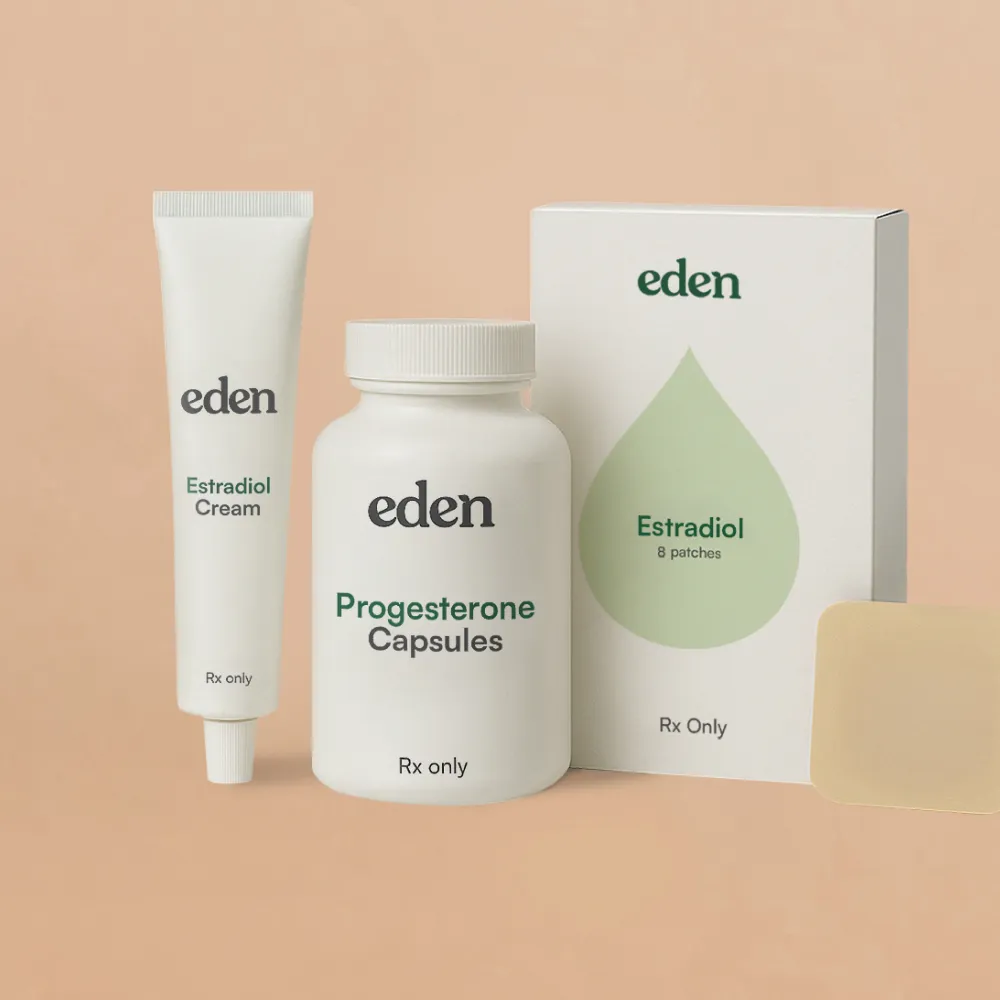Estradiol HRT Dosage Chart for Menopause Symptoms


Discover personalized estradiol HRT dosing for menopause support. Learn forms, typical doses, and how Eden connects you to licensed healthcare providers.
- Estradiol dosage varies by delivery method
Transdermal patches, vaginal creams, tablets, and rings all differ in absorption and symptom focus. - Personalized dosing is based on many factors
Menopause stage, symptom profile, health history, and uterine status may influence dosing decisions. - Lowest effective dose is the clinical goal
Licensed healthcare providers aim to recommend the lowest dose that offers symptom relief while minimizing potential risks. - Monitoring is essential
Ongoing evaluations help ensure treatment continues to align with your evolving needs. - Eden facilitates access
Eden connects patients with licensed healthcare providers and coordinates prescription delivery through state-licensed pharmacies.

Hormone Replacement Therapy (HRT) may be an important part of managing changes during menopause, and estradiol, a bioidentical form of estrogen, is one of the commonly prescribed hormones. However, not all estradiol therapies are the same. Whether you are navigating hot flashes, mood shifts, or vaginal discomfort, understanding the various delivery methods and how dosing is determined can help support informed conversations with your licensed healthcare provider.
This guide explains why estradiol dosing may be tailored to your needs, how absorption varies depending on the form of estradiol, and how Eden connects you with licensed healthcare providers who assess your medical history to recommend an appropriate treatment approach.
Why Estradiol Dosage Matters in Menopause
Estrogen levels naturally decline during perimenopause and menopause [1]. For some individuals, this may result in symptoms like night sweats, mood changes, or genitourinary discomfort. Estradiol HRT is sometimes prescribed to support symptom relief. However, determining the right dose depends on several individual factors:
- Menopause stage (perimenopause, menopause, postmenopause)
- Severity and type of symptoms
- Whether a uterus is present (which may influence the need for additional hormone support)
- Medical history and personal risk factors
- Lifestyle goals and preferences
A dosage that is too low may not offer sufficient relief, while a higher-than-necessary dose may increase the likelihood of side effects. The appropriate dose can only be determined by a licensed healthcare provider following a medical evaluation.
Estradiol Delivery Forms and Dosing Differences
Estradiol comes in multiple forms, and how your body absorbs the hormone may depend on the delivery method. The form chosen can influence which symptoms may be supported by treatment.
1. Transdermal Estradiol Patches (Commercial)
These patches deliver estradiol through the skin directly into the bloodstream. This method may avoid first-pass liver metabolism and is commonly used to support systemic symptoms.
- Typically applied once or twice weekly
- Common doses range from 0.025 mg/day to 0.1 mg/day
- Brands may include Vivelle-Dot®, Climara®, and Minivelle®
2. Vaginal Estradiol Creams (Commercial)
Most commercially available vaginal estradiol creams, such as Estrace®, contain 0.1 mg of estradiol per gram. A typical 0.5 g application would therefore deliver approximately 0.05 mg of estradiol. However, compounded formulations may vary in concentration depending on the prescribing licensed healthcare provider's instructions.
- Applied directly inside the vaginal canal
- Standard regimen starts with 0.5 g daily for two weeks, followed by 0.5 g applied one to three times per week
- Compounded formulations may vary in concentration based on the prescription written by a licensed healthcare provider
3. Other Estradiol Forms
- Vaginal Tablets: Commonly prescribed at 10 mcg daily for two weeks, followed by 10 mcg twice per week. These are used to support localized vaginal symptoms and have minimal systemic absorption.
- Oral Estradiol Tablets: Starting dose may be 1 mg/day, typically ranging from 0.5–2 mg/day
- Vaginal Rings: Provide daily estradiol (e.g., 7.5 mcg to 50 mcg) and may offer both local and limited systemic support
Note: These dosing examples are informational only. All treatment decisions should be made in consultation with a licensed healthcare provider.
{{primary-cta}}
Estradiol HRT Dosage Chart for Menopause Symptoms
Below is a general reference chart outlining the typical dosage ranges for commercial estradiol HRT options. These ranges do not represent personalized medical advice, and all dosing decisions should be made in partnership with a licensed provider.
Disclaimer: Dosage is always individualized by a licensed healthcare provider based on your medical history, symptoms, risk factors, and preferences.
How Licensed Healthcare Providers May Personalize Estradiol Dosing
The dosing of estradiol is not a fixed protocol but a personalized plan. Licensed healthcare providers may consider:
- Menopause phase and hormonal fluctuations
- Type and intensity of symptoms
- Medical history, including any contraindications
- Presence of a uterus and need for progesterone
- Response to initial treatment and side effect monitoring
The aim is to recommend the most appropriate dose that provides relief with minimal side effects, adjusted over time as needed.
Monitoring and Safety with Estradiol HRT
Safety considerations are central to hormone therapy. A licensed healthcare provider may provide:
- Ongoing monitoring: Regular check-ins help track progress and adjust the plan as needed
- Side effect management: Some individuals may experience breast tenderness, nausea, or spotting
- Additional hormone considerations: Individuals with a uterus often require a form of progesterone alongside estradiol
- Health screenings: Mammograms and other preventive screenings should continue as advised
Self-modifying a prescribed HRT regimen is not recommended. Ongoing oversight by a licensed healthcare provider may help ensure both safety and effectiveness.
{{primary-cta}}
How Eden Supports Access to Personalized Estradiol Therapy
Eden makes it simple to connect with licensed healthcare providers who evaluate your unique hormonal health and recommend a care plan tailored to your goals.
1. Virtual Evaluation
Start with an online intake that reviews your medical history, symptoms, and personal goals. You’ll be matched with a licensed healthcare provider experienced in hormone therapy.
2. Personalized Care Plan
Your provider will recommend a form and dose of estradiol that aligns with your needs, whether for localized symptom support or systemic considerations.
3. Ongoing Support
Adjustments may be made during follow-ups based on how you respond to therapy. Your care team remains available through Eden’s digital platform.
4. Seamless Medication Access
Once prescribed, medications are filled by state-licensed compounding or commercial pharmacies and shipped to your home.
Note: Eden does not manufacture medications, operate as a pharmacy, or provide medical care. Eden connects individuals with licensed healthcare providers and coordinates access to prescribed treatments through licensed pharmacies.
Begin Your Estradiol HRT Evaluation
Estradiol therapy may support symptom relief during menopause, but only when dosing is tailored, monitored, and responsibly managed. Eden provides access to licensed healthcare providers who offer thoughtful guidance based on your personal health profile.
Start your HRT evaluation with Eden’s care team today and explore how convenient, personalized hormone therapy may support your wellness goals.
Disclaimers:
- This article is for informational purposes only and is not medical advice.
- All hormone therapy should be prescribed and managed by a licensed healthcare provider.
- Eden does not manufacture medications or operate as a pharmacy.

Blog Components



The FDA does not approve compounded medications for safety, quality, or manufacturing. Prescriptions and a medical evaluation are required for certain products. The information provided on this blog is for general informational purposes only. It is not intended as a substitute for professional advice from a qualified healthcare professional and should not be relied upon as personal health advice. The information contained in this blog is not meant to diagnose, treat, cure, or prevent any disease. Readers are advised to consult with a qualified healthcare professional for any medical concerns, including side effects. Use of this blog's information is at your own risk. The blog owner is not responsible for any adverse effects or consequences resulting from the use of any suggestions or information provided in this blog.
Eden is not a medical provider. Eden connects individuals with independent licensed healthcare providers who independently evaluate each patient to determine whether a prescription treatment program is appropriate. All prescriptions are written at the sole discretion of the licensed provider. Medications are filled by state-licensed pharmacies. Please consult a licensed healthcare provider before making any medical decisions.
- Yang JL, Hodara E, Sriprasert I, Shoupe D, Stanczyk FZ. Estrogen deficiency in the menopause and the role of hormone therapy: integrating the findings of basic science research with clinical trials. Menopause. 2024 Oct 1;31(10):926-939. https://doi.org/10.1097/gme.0000000000002407
Thank you!
We'll be in touch.
Thank you!
























